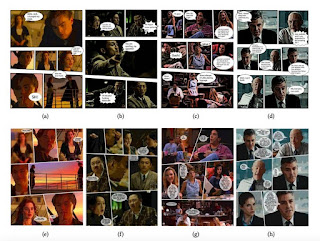I just caught this article from last month talking about some researchers who've developed a program to create comics automatically based on a video input. Give it an episode of Friends and it'll spit back a comic based on it, including stylized word balloons and a range of page layouts.
The gist of the program is that it identifies "key" frames from the video, interprets the tone of the dialogue, and assigns word balloons to the speakers in those key frames. The reseachers note that it's certainly not perfect yet, and it sometimes generates key frames that are so similar to one another as to appear repetitive. But, judging by the samples at least, the results aren't too bad. Nothing for current comics creators to worry about as far as competition at this point.
But the "at this point" part is noteworthy.
Comic adaptations of TV shows and movies -- whether they were illustrated or fumetti -- used to be a bigger thing because most people didn't have the ability to re-watch movies once they left theaters. You could catch Wizard of Oz or It's a Wondeful Life once a year when they were shown on network TV, but the number of films that got repeat viewings like that were few and far betweeen. But once home video started becoming common in the 1980s, the "need" to use comics as a means to relay a movie in a home environment largely disappated. It was much quicker, easier, and cheaper to copy the movie to video tape, and send copies out to a bunch of Suncoasts and Blockbusters and whatever. Eventually streaming options became viable and there was almost zero time between a movie leaving the theater and having it available for home viewing. Not to mention distributors being able to get, at almost no additional cost, even their cheapest, cheesiest, crappiest movies out for additional viewings. And additional revenue.
Which is why comic adaptations are rarer now than they used to be.
But if you can generate those comics on the fly, with almost no additional costs, a movie studio can still earn additional income off that. It might not have been worth it before, but by presenting these AI-generated adaptations, you could post them online for free or set them up to print-on-demand. Virtually zero additional costs to the movie producers, but with extra income they don't even have to use to pay back printers and distributers and the like. A studio that makes every movie available like this risks basically nothing, but has the potential to gain a new revenue stream. I fully expect studios to pick up on this as soon as researchers perfect it some more.
There are certainly other use cases possible here. For example, as an alternative to closed captions for the hard-of-hearing that also read slowly and/or have other reading difficulties like dyslexia. I'm sure there are plenty of other more laudable uses, but those will all be outlier cases. Not because they're necessarily rare or less important, but because they probably won't be as profitable and, well, we do live in a capitalistic dystopia after all.
But for those of you concerned about artists losing their jobs over this... I do see it as a concern, but I'm sure we're looking at least a decade, maybe two, before this technology is smooth enough to work in the real world. But the additional layer of concern, it seems to me, is that if an AI is able to select key frames like this, couldn't it create "key frames" from a script using some 3-D figures and locations? You wouldn't even have the need to film anything to begin with, taking everyone out of the creation process except the writer. (At least based on what I'm talking about.) That might be used for storyboarding as well.
Back in 2018, I noodled on the idea of comics being created without the use of illustrators. One guy placing pre-created figures into pre-created environments. Kind of paint-by-numbers approach to making comics. It's still too nacent to be functionally practical, but it's possible. With the technology above, you could theoretically do the same thing without even that one guy placing the figures!
Again, still a ways off from commercial viability, but it'll be interesting to see how this develops.
Now Available!
Blog Archive
-
▼
2021
(290)
-
▼
March
(26)
- What's Going on with Andy?
- What the Font Review
- Alice, Secret Agent of Wonderland Review
- Weekly Recap
- Upcoming Comics Calendar
- How Much Research Is Too Much?
- Robert Zuppke, Cartoonist?
- Punk Seth?
- The Original Infinity War
- Weekly Recap
- I Love the Smell of Old Comics in the Morning
- The Most Iconic -- but WRONG! -- FF Image
- Build an Army of 3D-Printed Supermen!
- The Origin of the Annual
- What Was Intended for FF #51?
- Weekly Recap
- Draw 50 Famous Cartoons As an Old Strip Primer
- Petty's Runnin' Down a Dream
- Buster Brown
- Tell No Tales Review
- AI-Created Comics
- Weekly Recap
- Upcoming Comics Events
- Lost in Translation
- What Comic Strips Can Teach Webcomics
- From Doorman to Micro-Face
-
▼
March
(26)







0 comments:
Post a Comment